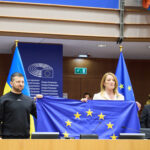The EU and its partners want to stand up for human rights.
On Monday, the Council of the European Union – representing the interests of the 27 EU member states – adopted so-called restrictive measures against various individuals from North Korea, Libya, Russia and South Sudan. And, for the first time, Chinese officials were also singled out for sanctions.
The measures, which are part of the EU’s Global Human Rights Sanctions mechanism adopted last December, include a travel ban and asset freeze for the persons concerned as well as the impossibility to receive funds from any entity or person in the EU. The mechanism allows the EU to take joint action concerning third countries which are considered serious human rights violators.
“Surveillance, detention and indoctrination”
Four individuals were named by the EU for their role in the ongoing persecution of tens of thousands of members of the Uyghur community in China’s Xinjiang province. For years, China has stood accused of blatant and large-scaled arbitrary detention of Uyghurs and of herding them into forced labour camps.
Among the four people named in the Official Journal of the EU was Zhu Hailun, who Brussels considers being the architect of a programme of “overseeing and implementing a large-scale surveillance, detention and indoctrination” targeting the Uyghurs and people from other Muslim ethnic minorities. Also named were Wang Junzheng, Wang Mingshan and Chen Mingguo. The three are leading Communist Party officials in Xinjiang province.
Simultaneously, several non-EU countries adopted similar restrictive measures against China. Dominic Raab, the British Foreign Secretary, called the Uyghur treatment by China “the largest mass detention of an ethnic and religious group since the Second World War”. The United Kingdom put the same four Chinese officials on its sanctions list than the EU.
Several members of the European Parliament are among the persons targeted by the government in Beijing, including @bueti, @rglucks1 and @gahler. Their crime? They highlighted grave human rights violations in China, including against the #Uighurs. For China, these are "lies". https://t.co/828XC2ZoqO
— EU Watch (@EUWatchBrussels) March 22, 2021
The United States followed suit. Washington singled out Wang Junzheng and Chen Mingguo for sanctions. “These individuals are designated pursuant to Executive Order 13818, which builds upon and implements the Global Magnitsky Human Rights Accountability Act and targets perpetrators of serious human rights abuse and corruption,” the US Treasury Department said in a statement. “Amid growing international condemnation, [China] continues to commit genocide and crimes against humanity in Xinjiang,” US Secretary of State Antony Blinken stated in harsh words. He urged an end “to the repression of Uyghurs” and “members of other ethnic and religious minority groups in Xinjiang, including by releasing all those arbitrarily held in internment camps and detention facilities.”
Counter-measures
Beijing reacted immediately – and hit back angrily. China issued a ban on ten individuals from the EU, among them several members of the European Parliament and national parliaments. Also targeted were entire institutions.
A statement from the Foreign Ministry stated: “The Chinese side decides to sanction the following ten individuals and four entities on the EU side that severely harm China’s sovereignty and interests and maliciously spread lies and disinformation: Reinhard Bütikofer, Michael Gahler, Raphaël Glucksmann, Ilhan Kyuchyuk and Miriam Lexmann of the European Parliament, Sjoerd Wiemer Sjoerdsma of the Dutch Parliament, Samuel Cogolati of the Belgian Federal Parliament, Dovile Sakaliene of the Seimas of the Republic of Lithuania, German scholar Adrian Zenz, Swedish scholar Björn Jerdén, Political and Security Committee of the Council of the European Union, Subcommittee on Human Rights of the European Parliament, the Mercator Institute for China Studies in Germany, and the Alliance of Democracies Foundation in Denmark.” The statement added that “The individuals concerned and their families are prohibited from entering the mainland, Hong Kong and Macao of China. They and companies and institutions associated with them are also restricted from doing business with China.”
Investment agreement in doubt
In the past, the EU only adopted sanctions against entire countries when there was a UN Security Council recommendation in place to do so. Recently, the EU has preferred a more targeted approach. What the new, tough stand against human rights violations by the Chinese regime will mean for the recently concluded EU-China Comprehensive Investment Agreement (CAI) remains to be seen. It was meant to open up China further to EU investment and also introduced some measures designed to protect against forced labour and exploitation.
Ratification of CAI is not becoming more probable when the PRC sanctions 5 MEPs from the 4 major democratic political groups in the EP in order to "punish" free speech that is critical of the CCP's authoritarian regime. https://t.co/0FdsDugdt7
— Reinhard Bütikofer (@bueti) March 22, 2021
Moreover, there are many within the EU who want to take a more conciliatory stance on China, not least in view of securing vaccines against the Covid-19 pandemic. However, Beijing’s harsh reaction to the concerted measures against Chinese officials by the West will probably have hardened the mood in the European Parliament, which will need to ratify the CAI.
Inmaculada Rodríguez-Piñero, a Spanish MEP for the Socialist Group in the legislature, said: “Europe needs to trade with China, but our values and standards go first. We stand by our principles and we will defend our principles. To win our backing for the investment deal, China will need to present a clear roadmap on the implementation of International Labour Organisation conventions against forced labour, and on improving the human rights situation in the country. China must show signs of a change in the human rights situation and commit to a road map of changes.”
Authors: Hélorie Duval, Michael Thaidigsmann






